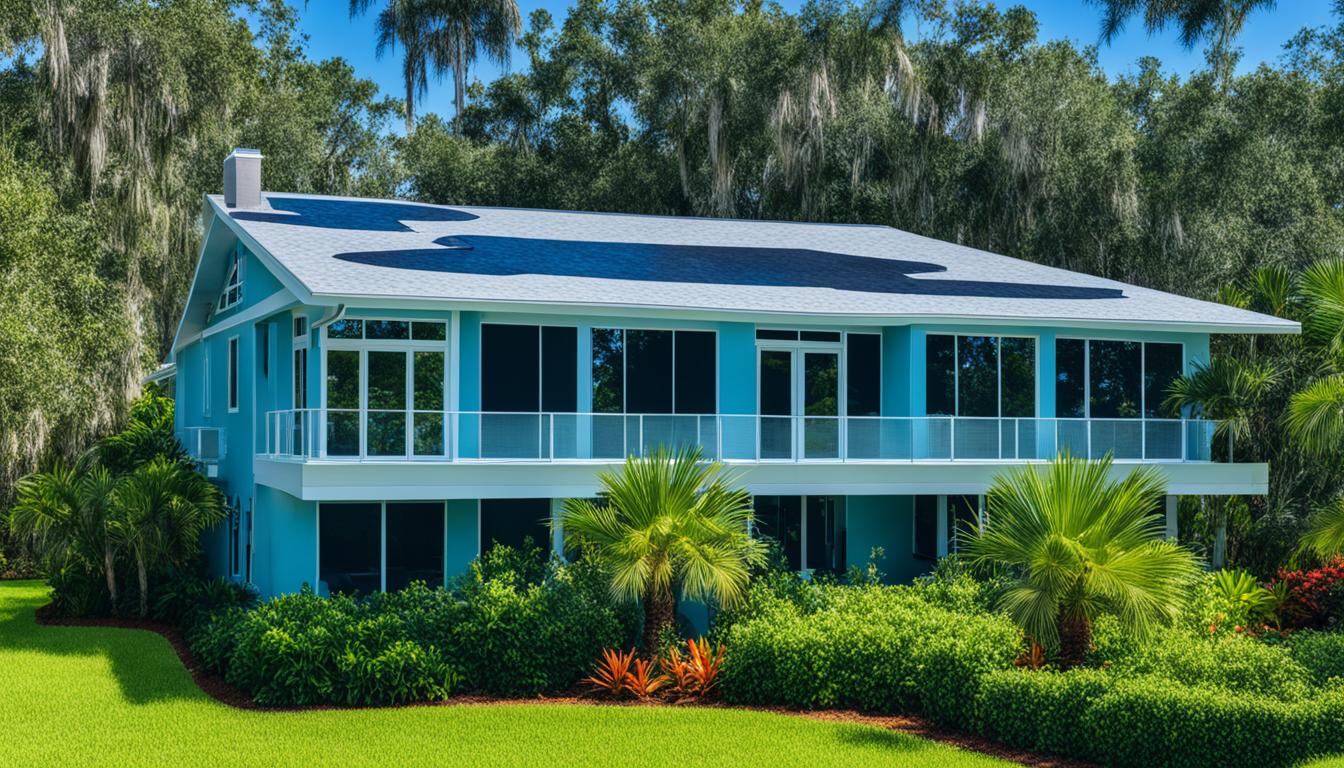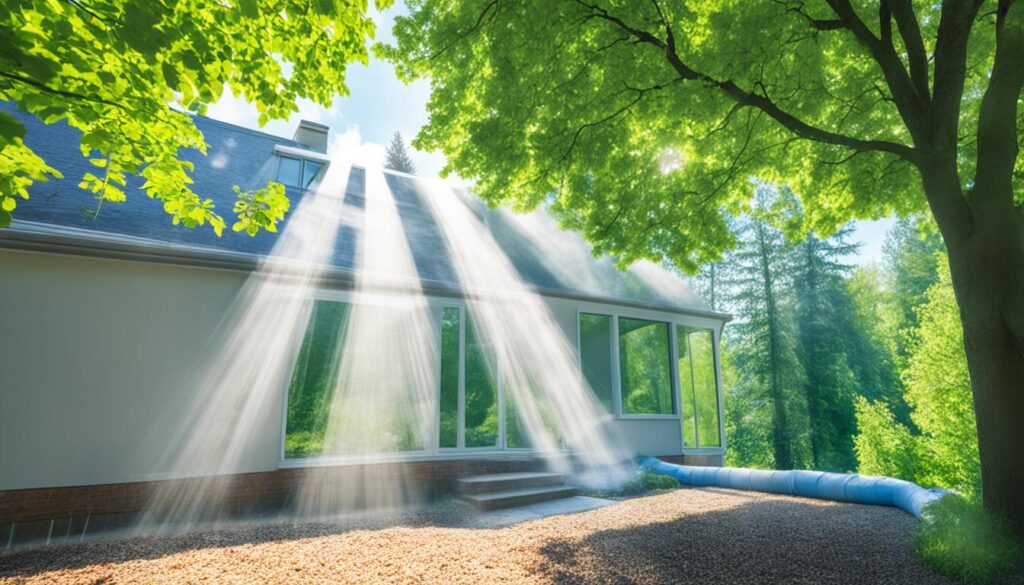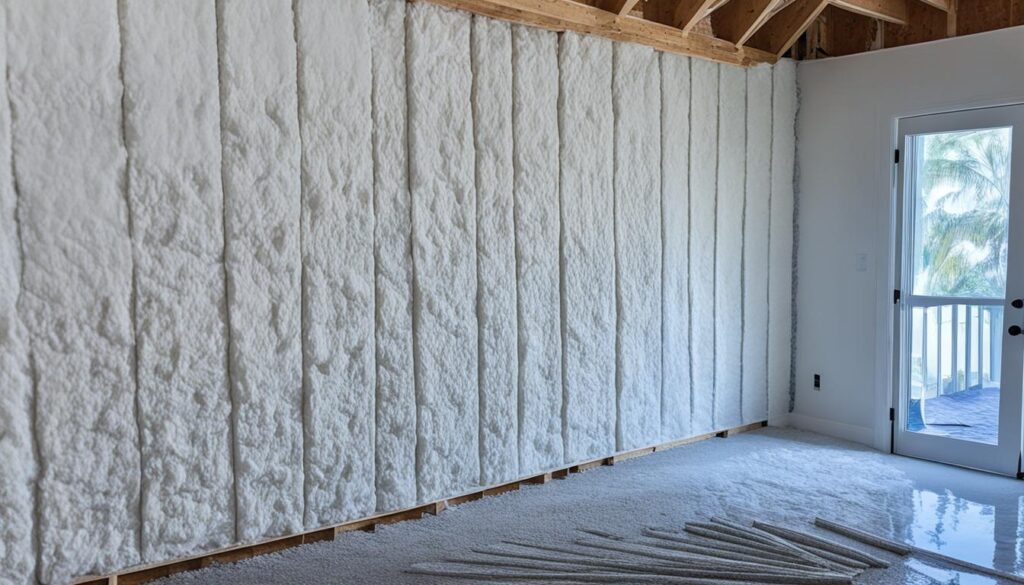
Proper Insulation’s Role in Florida Mold Prevention
In the humid climate of Florida, mold can be a persistent problem for homeowners and property owners. However, one key factor that plays a crucial role in preventing mold proliferation is proper insulation. Effective insulation solutions not only help maintain optimal temperature and humidity levels but also create a barrier that prevents moisture from seeping into the building’s structure. In this section, we will explore the important role that proper insulation plays in mold prevention in Florida.
Key Takeaways:
- Proper insulation is essential for mold prevention in Florida.
- Insulation helps regulate temperature and humidity levels.
- Insulation creates a moisture-resistant barrier, reducing the risk of mold infestation.
- Controlling condensation and minimizing air leaks eliminates conditions favorable for mold growth.
- Selecting insulation materials suitable for Florida’s climate is crucial.
If you require a mold assessment or need assistance with mold prevention and remediation, contact Fix Mold Miami at 305-465-6653, Florida’s highest-rated provider of mold assessments, prevention, and remediation services.
The Benefits of Insulation in Mold Prevention
Insulation plays a vital role in preventing mold growth by creating a protective barrier that regulates temperature and humidity levels within a building. In humid areas like Florida, where moisture control is crucial, proper insulation solutions are essential for mold prevention. Let’s explore the numerous benefits of insulation in combating mold in humid areas and discover effective techniques for mold prevention.
Regulating Temperature and Humidity
One of the primary benefits of insulation is its ability to regulate temperature and humidity levels. By creating an efficient thermal envelope, insulation helps maintain a stable indoor climate, reducing the likelihood of excess moisture buildup. This controlled environment inhibits the conditions that mold spores require to thrive, effectively preventing mold growth.
Moisture-Resistant Barrier
When selecting insulation materials, it is crucial to choose options that offer moisture resistance. Moisture can seep into the building’s structure through leaks, condensation, or high humidity levels. Effective insulation solutions act as a protective barrier, preventing moisture from penetrating and accumulating within walls, ceilings, or floors. By creating a moisture-resistant barrier, insulation significantly reduces the risk of mold infestation.
Minimizing Air Leaks
Insulation techniques focus on minimizing air leaks within the building envelope, which can contribute to moisture-related issues. Uncontrolled air leaks allow warm, humid air to enter the building, leading to condensation and providing an ideal environment for mold growth. Properly installed insulation seals these air leaks, preventing the entry of moist air and ensuring a dry and stable indoor climate.
Mold Prevention Techniques
Insulation, coupled with other mold prevention techniques, strengthens a building’s defense against mold. By integrating proper insulation with techniques such as effective ventilation, moisture barriers, and routine inspections, property owners can create a comprehensive mold prevention strategy. These techniques work synergistically to control moisture levels and create an inhospitable environment for mold.
Case Study: Insulation Solution for a Florida Home
“Our client, Mr. Johnson, faced persistent mold issues in his Florida home due to high humidity levels. To combat this problem, our team recommended the installation of closed-cell spray foam insulation. The insulation not only regulated temperature and humidity but also created a moisture-resistant barrier that prevented mold growth. Since the implementation, Mr. Johnson has experienced a significant reduction in mold infestation and enjoys a healthier living environment.”
– GreenTech Insulation Solutions
Conclusion
Insulation plays a critical role in mold prevention in humid areas like Florida. By regulating temperature and humidity levels, creating a moisture-resistant barrier, and minimizing air leaks, insulation effectively combats mold growth. When integrated with other mold prevention techniques, proper insulation solutions provide comprehensive protection against mold infestation. Implementing these strategies ensures a healthier, mold-free environment for property owners in humid areas.

Strategies for Effective Insulation in Florida
Florida’s unique climate presents specific challenges when it comes to insulation and mold prevention. Incorporating the right insulation strategies is crucial to maintain a comfortable living environment while minimizing moisture-related issues. In this section, we will discuss the key considerations for selecting insulation materials suitable for Florida’s climate, including factors such as heat resistance, moisture resistance, and durability. We will also explore innovative insulation techniques and best practices for mold prevention in buildings located in Florida.
The Importance of Heat Resistance
When choosing insulation materials for buildings in Florida, it is essential to consider their heat resistance capabilities. The intense heat and sunlight in the region can cause significant thermal stress on the building’s envelope. Insulation with high heat resistance helps mitigate the transfer of heat from the outside to the inside, maintaining a comfortable indoor temperature and reducing the strain on cooling systems.
Moisture Resistance Matters
Another critical factor to consider in insulation selection is moisture resistance. In Florida’s humid climate, moisture can easily infiltrate the building’s structure and contribute to mold growth. Opting for insulation materials that are specifically designed to resist moisture absorption can help create a barrier that prevents mold-promoting conditions.
Durability for Long-lasting Protection
Given the challenging climate conditions in Florida, durability is key in insulation materials. The selected insulation should be able to withstand the region’s high temperatures, intense sunlight, and potential hurricane-related impacts. Durable insulation ensures long-lasting protection against mold and moisture issues, providing peace of mind for property owners.

Conclusion
Proper insulation plays a pivotal role in mold prevention in Florida’s humid climate. By effectively controlling temperature and humidity levels, insulation creates a protective barrier that minimizes the risk of mold infestation within buildings. This is particularly crucial in a state like Florida, where the high humidity levels can contribute to mold growth.
When selecting insulation materials, it is important to consider their ability to resist both heat and moisture. By choosing insulation solutions that are specifically designed for Florida’s unique climate, property owners can ensure optimal mold prevention and climate control. A combination of moisture-resistant and heat-resistant insulation materials is key to maintaining a comfortable living environment while minimizing the conditions that promote mold growth.
Implementing effective insulation strategies can lead to healthier and safer living spaces. By creating a moisture-resistant barrier, insulation prevents the infiltration of dampness into the building’s structure, minimizing the risk of mold infestation. Property owners who prioritize proper insulation can enjoy peace of mind knowing that they are taking proactive measures to prevent mold and maintain a mold-free environment.
If you require a professional mold assessment or need assistance with mold prevention and remediation, contact Fix Mold Miami at 305-465-6653, Florida’s highest-rated provider of mold assessments, prevention, and remediation services. They have the expertise and resources to help you ensure that your property remains mold-free in Florida’s challenging climate.




